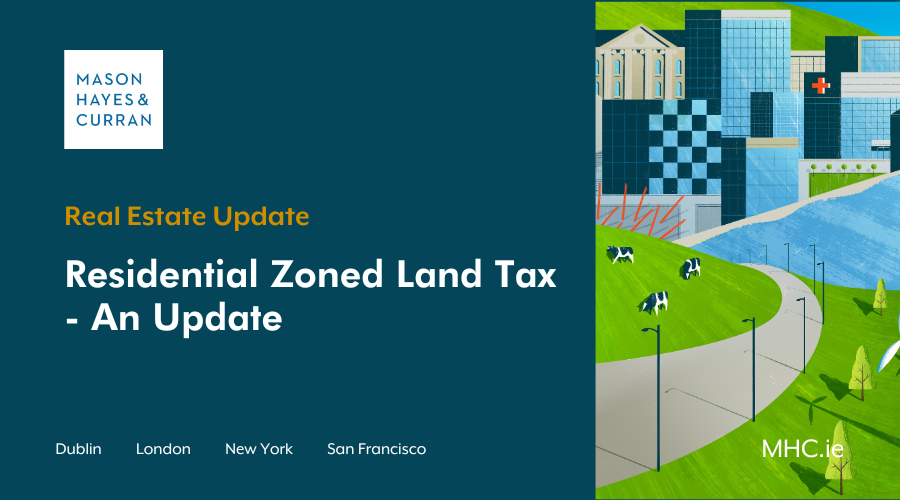
The Residential Zoned Land Tax is intended to increase the housing supply by encouraging the development of lands that have been serviced and zoned wholly or partly for residential use. Our Real Estate team reviews the dates of liability and how they may impact landowners.
The Residential Zoned Land Tax (RZLT) is a new tax introduced as part of the Government’s “Housing for All – a New Housing Plan for Ireland”. RZLT is intended to increase the housing supply by encouraging the development of lands that have been serviced and zoned wholly or partly for residential use.
RZLT was intended to be payable from 2024. However, the Finance (No.2) Act 2023 deferred the first liability date until 1 February 2025. Landowners will be able to register for RZLT from December 2024 on Revenue’s Online System (ROS).
On 1 February 2024, local authorities published draft maps identifying land within the scope of the tax, as well as land which they propose to exclude. A revised and final RZLT map will be published by 31 January 2025. This will indicate the land for which RZLT is payable. Local authorities will update this map annually from 2025 onwards for changes in the status of land.
The basics
Relevant sites will be taxed annually at 3% of the market value of the land. The first valuation date is 1 February 2025. The tax is administered on a self-assessment basis, meaning that the landowner must assess the market value. Surcharges may be payable if the land is undervalued.
Land will only be included on the final RZLT map in 2025, and therefore liable for tax, if it met the relevant criteria on or before 1 January 2022. Land which met or will meet the criteria at a later date will be subject to RZLT in the third year after the year it came within the scope of the tax.
Who and what?
For the purposes of RZLT, ‘serviced’ means sites already connected or able to be connected to the necessary public infrastructure and facilities including road and footpath access, public lighting, foul sewer drainage, surface water drainage and water supply.
The persons liable to pay RZLT will be the “owners” of a relevant site. Owners is defined broadly in the legislation and includes any person who holds an interest or right to carry out development on or to the land. This could extend to include developers with contractual rights to develop the land.
A limited number of exclusions from the scope of RZLT are available, including:
- Existing residential properties that are liable for Local Property Tax are not subject to RZLT. However, if the garden or yard attached to the residential property is greater than 0.4047 hectares (one acre), you must register for the tax, but you will not be liable to pay it,
- Land that is zoned for a mixture of residential and other uses, where it is reasonable to consider the land is integral to the operation of a business carried out on or beside it,
- Land used for certain infrastructure or facilities including utilities, transport, and facilities for social, community or recreational purposes,
- Sites which are designated as a derelict site and subject to the Derelict Sites Levy, and
- Land which is subject to a phasing restriction in a development plan and the restriction has not yet been satisfied.
Deferral of payment of RZLT is possible in limited circumstances, including:
- Where there is an appeal or a judicial review pending regarding the RZLT or planning permission that has been granted (except where the appeal is made by the landowner or a connected party),
- Where a commencement notice is lodged in respect of residential development of the land. RZLT is deferred until (i) the date when the works permanently cease or (ii) there is a change of ownership or (iii) the planning permission expires. RZLT ceases to apply after the completion of the development of houses on the site.
Making a submission or an appeal
The owner or a third party can make a submission to the local authority regarding the land. These submissions can:
- Propose a correction if you believe that land included on the map does not meet the RZLT criteria,
- Propose a correction to the date on which the land first met the criteria,
- Propose the inclusion of land, not identified on the map, if you believe that such land meets the criteria,
- Support the exclusion of land where it is identified on the map as being excluded.
The deadline to make a submission to the relevant local authority is 1 April 2024. All submissions will be published on the local authority website by 11 April 2024 (with personal information redacted).
If you request the exclusion of your land from the map or challenge the date from which the land first met the criteria, the local authority must notify you of its decision by 1 July 2024. If you request the addition of land to the map, and the local authority is satisfied that the land meets the RZLT criteria, then this land will be identified on the next annual draft map published by the local authority on 1 February 2025. Therefore, this land will not be liable for RZLT until 2026. Local authorities are not obliged to respond to submissions from third parties.
If the local authority rejects your submission, you can appeal to An Bord Pleanála by 1 August 2024.
Requesting a change of zoning
Owners can request a change of zoning of their land by 31 May 2024, if the land is identified on the draft map. The local authority must notify you of its decision whether or not to rezone by 31 July 2024. You cannot appeal a rezoning request to An Bord Pleanála.
Conclusion
We encourage owners to take note of the important dates and deadlines. It is important to take a pro-active approach to engaging with local authorities on draft maps and with Revenue for any potential deferral of the tax.
For more information regarding RZLT and how it may affect your land please contact a member of our Real Estate team.
The content of this article is provided for information purposes only and does not constitute legal or other advice.
Share this:




